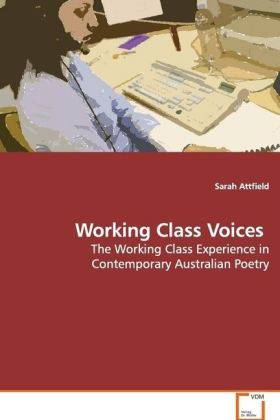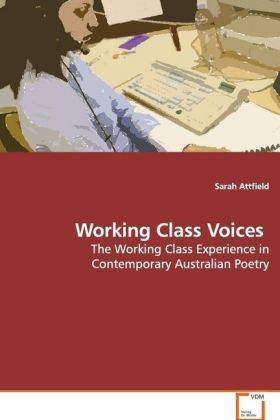
Bedankt voor het vertrouwen het afgelopen jaar! Om jou te bedanken bieden we GRATIS verzending (in België) aan op alles gedurende de hele maand januari.
- Afhalen na 1 uur in een winkel met voorraad
- In januari gratis thuislevering in België
- Ruim aanbod met 7 miljoen producten
Bedankt voor het vertrouwen het afgelopen jaar! Om jou te bedanken bieden we GRATIS verzending (in België) aan op alles gedurende de hele maand januari.
- Afhalen na 1 uur in een winkel met voorraad
- In januari gratis thuislevering in België
- Ruim aanbod met 7 miljoen producten
Zoeken
Working Class Voices
The Working Class Experience in Contemporary Australian Poetry
Sarah Attfield
Paperback | Engels
€ 77,95
+ 155 punten
Omschrijving
Contemporary Australian poetry neglects its working
class voices. Literary journals rarely publish poetry
that focuses on working-class life and there is
little analysis of the poetics of class in
contemporary Australian scholarship on poetry. This
book argues that there is a strong and vibrant body
of contemporary Australian working-class poetry that
merits greater public attention and more incisive
critical review. This book offers an analysis of the
content and poetics of contemporary Australian
working-class poetry and of the context in which it
has been produced. It presents works that to date
have been ignored or dismissed by the literary
mainstream. It proposes that working-class poetry can
be regarded as a distinctive genre of poetry, and
argues that working-class poetry provides important
insights into class inequalities. In short, this book
creates a poetic for approaching the academic
analysis of working-class cultural discourse. This
book should be useful to anyone interested in
Australian poetry and working-class studies. The book
is written in an accessible style that will also
hopefully appeal to readers outside of educational
institutions.
class voices. Literary journals rarely publish poetry
that focuses on working-class life and there is
little analysis of the poetics of class in
contemporary Australian scholarship on poetry. This
book argues that there is a strong and vibrant body
of contemporary Australian working-class poetry that
merits greater public attention and more incisive
critical review. This book offers an analysis of the
content and poetics of contemporary Australian
working-class poetry and of the context in which it
has been produced. It presents works that to date
have been ignored or dismissed by the literary
mainstream. It proposes that working-class poetry can
be regarded as a distinctive genre of poetry, and
argues that working-class poetry provides important
insights into class inequalities. In short, this book
creates a poetic for approaching the academic
analysis of working-class cultural discourse. This
book should be useful to anyone interested in
Australian poetry and working-class studies. The book
is written in an accessible style that will also
hopefully appeal to readers outside of educational
institutions.
Specificaties
Betrokkenen
- Auteur(s):
- Uitgeverij:
Inhoud
- Aantal bladzijden:
- 280
- Taal:
- Engels
Eigenschappen
- Productcode (EAN):
- 9783639036169
- Uitvoering:
- Paperback

Alleen bij Standaard Boekhandel
+ 155 punten op je klantenkaart van Standaard Boekhandel
Beoordelingen
We publiceren alleen reviews die voldoen aan de voorwaarden voor reviews. Bekijk onze voorwaarden voor reviews.









